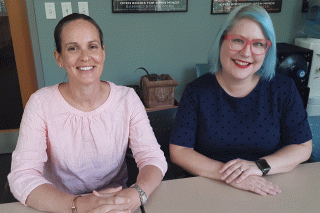College of Organizational, Computational, and Information Sciences and College of Social Sciences, Policy, and Practice faculty collaborate to support the mental health needs of library patrons, and the staff who serve them.
The public library has become many things to many people — a resource for information, entertainment, readers, public events, local forums and internet access. For others it offers vital shelter from the elements. For people who are homeless or struggle with addiction, the public library often becomes the focal point for those in desperate need of support. To meet this need, Assistant Professors Lydia Ogden of the School of Social Work and Rachel Williams of the School of Library and Information Science have collaborated on a project to prepare librarians to support patrons in crisis at public libraries.
Dr. Ogden’s research focuses on people living with serious mental health diagnoses and problematic substance use. When she learned about how these people were using libraries, she was immediately interested. “Libraries have a lot of potential as a non-stigmatizing, safe, and healing space for people in crisis.”
Williams can certainly speak to that as she created strong connections with patrons experiencing crises when working at public libraries in Washington. “Being able to support them was an important part of providing good service to them as patrons,” she said.
She also noticed comparisons between librarians and social workers; given the librarian’s visibility in the community, she was curious about the blurred line between the professions. When she arrived as Assistant Professor at Simmons in 2017, she was eager to find a collaborator in the School of Social Work.
Their project consists of two phases. The first is a series of focus groups designed at examining ways in which library staff can build service skills and engage with patrons in crisis. The second phase involves building on identifying department and branch service issues and developing workshops to address these concerns. They are also looking at training future librarians to be prepared for this work, with focused curriculum and partnerships between social work and LIS studies.
One point confirmed by their research is the importance of self-care and building resilience to counteract burnout for public librarians. “These are not topics we focus on in library school,” Williams said. “Staff are often left struggling with the emotional toll that comes with providing an increasing amount of support services to people in crisis. Any opportunity to talk through incidents that happen and build a support community within the library is also helpful for staff.”
As an instructor, Williams would like to broaden student understanding of working in a public library. “We are fortunate to build a solid theoretical foundation for library school students, but an opportunity to work at a public library or speak to a public library staff is invaluable, to see how the theoretical underpinnings of what we do operates in practice.”
Williams also wants her students to understand that anyone working in a library may need to support a patron in crisis, no matter their role: “Recognizing that is important and helps build empathy before a student even steps into a public library staff role.”
Future collaborations between LIS and social work curriculum are of interest. “I would love to see a social work or social services oriented certificate program for library school students,” said Williams. “I also believe that coordinating with public libraries and social work departments can provide some valuable field placements for social work students.”
Ogden agreed, with an emphasis on field placements in libraries as a great opportunity for social work students to serve patrons in crises. “Within the social work curriculum, training students to work in environments that are not traditionally social work areas, such as libraries, could be especially useful.”
“LIS and social work are obviously two very distinct professions.” Ogden added. “The challenge that’s emerging now is that librarians and staff are increasingly in a position where clinical skills, like crisis counseling, would be really useful, but they don’t have those skills. So that’s where collaboration with social work is vital. The other thing is while social workers and public library staff are both exposed to emotionally taxing situations when they work with clients in crisis, only social workers are routinely taught about burnout and self-care, and these issues are not addressed in LIS education in the same way.”
Williams is hoping to change that: “I am fascinated by the opportunity to continue to explore what self-care and resilience look like for public library staff. For example, can we build a toolkit so that staff can start working on building these skills?”
Ogden agrees, “I think there is a lot of opportunity to share critical knowledge and skills generated by social work, which would greatly benefit LIS students and public library staff.”

